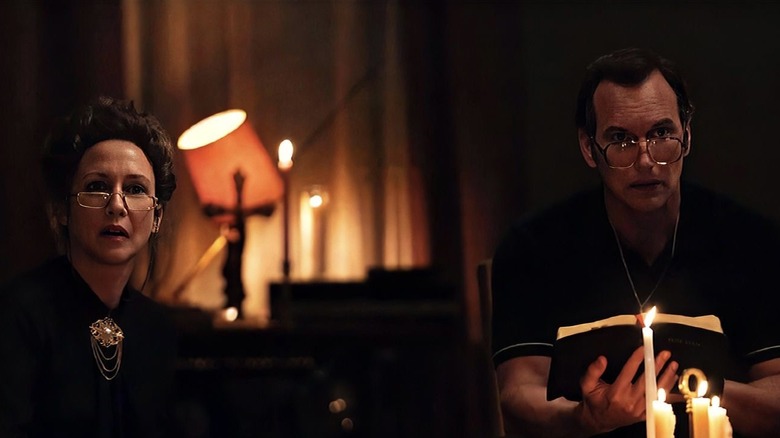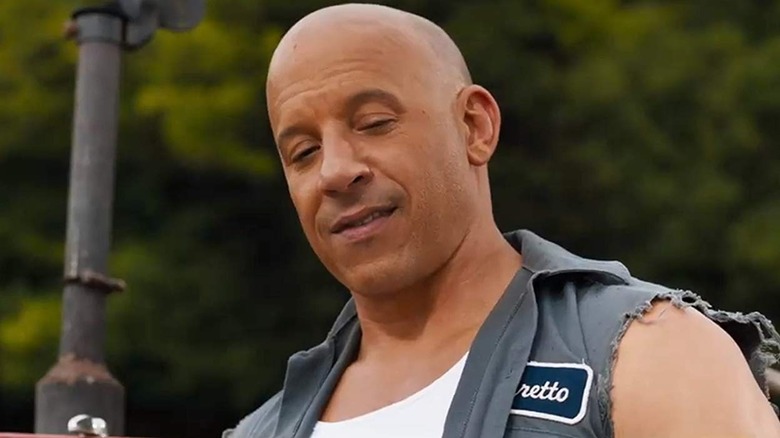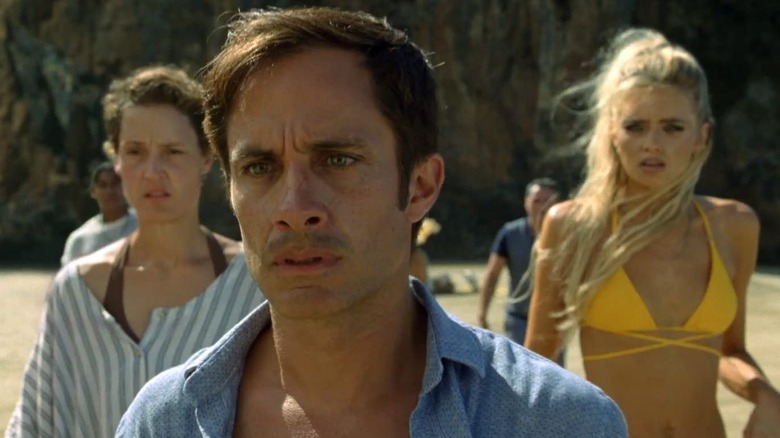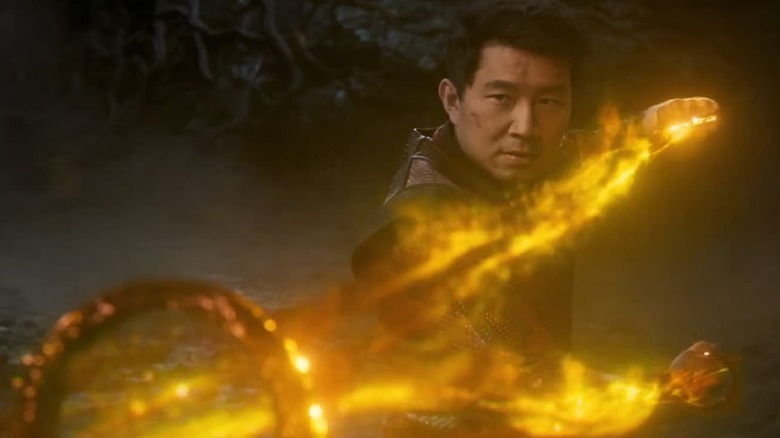5 Biggest Winners At The Box Office In This Bizarre, Pandemic-Stricken Summer
The summer movie season is over. Onto fall we go. The hope heading into the summer, especially as COVID cases were declining and movies like "Godzilla vs. Kong" were lighting up the box office, was that this year would be a big rebound for the industry. It didn't exactly pan out that way. What we got was a mixed bag of hybrid releases, runaway hits, disappointments, and surprises. But even in perhaps the strangest year ever at the summer box office, here were a handful of clear winners worth highlighting.
Here are the five biggest winners from summer 2021 at the box office.
A Quiet Place Part II
Man oh man, did Paramount find themselves a golden goose with "A Quiet Place" in 2018. It was hard to imagine that Jim from "The Office" would end up directing one of the most effective, horror-driven popcorn blockbusters of the modern era. And yet, here we are. I was at the world premiere screening at SXSW and will never forget that feeling. Naturally, after the original flick made $334 million against a comparatively tiny $17 million budget, a sequel was going to happen.
And that sequel was released, more than a year after it was originally supposed to, on May 28, exclusively in theaters. That proved to be one of the big keys here. Not only that but John Krasinski managed to make a worthy follow-up that both critics and audiences were compelled by. It proved to be a winning formula.
"A Quiet Place Part II" effectively kicked off the summer movie season in earnest with a huge $47.5 million opening domestically. It finished with a stunningly good $160 million, behind only a certain "Fast," and quite possibly furious, movie we'll be talking about in a second, and Marvel's "Black Widow." All told, the sequel took in $297.3 million globally. Yes, it had a larger $61 million production budget. But that is still 4.8 times its budget. Expect this universe to expand in the coming years.
The Conjuring: The Devil Made Me Do It
When "The Conjuring" was released in 2013, it was felt in a big bad way. This was more than just your average hit horror movie. What director James Wan managed to craft with his take on the case files of paranormal investigators Ed and Lorraine Warren was nothing shy of brilliant. It also happened to come at a time when cinematic universes were becoming all the rage in Hollywood, thanks to the Marvel Cinematic Universe. The perfect storm.
Eight years after that initial entry, and several franchise-expanding entries later, Vera Farmiga and Patrick Wilson returned with this year's "The Conjuring: The Devil Made Me Do It," the third entry in the main series. Directed by Michael Chaves ("The Curse of La Llorona") it was released right in the heart of the summer movie season on June 4. But, like every other Warner Bros. movie this year, it was also released on HBO Max at the same time. Be that as it may, the studio managed to crank another home run right out of the park with a tried and true franchise.
"The Conjuring 3" kicked things off with a rock-solid $24 million opening weekend against a reported $40 million production budget. It wrapped up its run with $65.5 million domestically. But the key here is that international audiences really showed up for this one. All told, the film earned $134.6 million around the globe. That brings its total to $200.2 million — roughly five times its budget. Who says mid-budget movies can't work? While that's significantly less than what "The Conjuring 2" conjured up ($310 million), it's an unquestionable win and would be even in non-COVID times. Even without Wan at the helm, this one still has plenty of gas left in the tank.
F9
What a remarkable journey the "Fast & Furious" franchise has been on. It started, rather humbly, in 2001 as what was essentially a remake of "Point Break" without being labeled as such. As a reminder, we did get an expensive disaster of an actual "Point Break" remake in 2015 that is one of the truly remarkable box office flops of the modern era. But that's a conversation for another time. Twenty years later, Vin Diesel and his Fast Family are still going strong, as evidenced by "F9."
While the ninth main entry in the so-called "Fast Saga" was delayed significantly by the pandemic, when it finally arrived, it proved that Hollywood blockbusters can indeed still provide the sort of global theatrical revenue needed for these kinds of movies to make sense in the future. It was a big hit that hardly seemed hampered by the extenuating circumstances.
A $70 million domestic opening weekend. A $172.8 million domestic haul. A staggering $537.9 million international take. A $710.8 million total take. Yes, "The Fate of the Furious" earned $1.23 billion, but let us not forget a few important things unrelated to the pandemic. This is the first "Fast & Furious" movie to not include either Paul Walker's Brian O'Connor or Dwayne "The Rock" Johnson's Luke Hobbs. That's taking two awfully mighty chess pieces off the board. So $710 million, especially under these circumstances, is a crushing home run in my humble opinion. Not to mention the franchise, all told, stands at $6.6 billion worldwide.
Old
Say what you will about M. Night Shyamalan but the man has been on a hot streak (financially speaking) over the last handful of years. After suffering a string of flops including "The Last Airbender" and "After Earth," the filmmaker behind "The Sixth Sense" found his footing again with the simple horror flick "The Visit." Shyamalan was back, baby. After scoring monster hits with "Split" and "Glass," rounding out his "Unbreakable" trilogy, he returned this summer with "Old." Again, the man found himself with a hit on his hands.
"Old" was met with mixed reviews but had that classic Shyamalan intrigue. Released in July during peak summertime moviegoing, the movie scored a solid $16 million domestic opening. It has since racked up $87.3 million worldwide. Even taking its reported $18 million budget into account, that is still 4.8 times its budget. That is a heck of a return. Not to mention that Shyamalan financed the movie himself, as he's done with his past several movies. And his reasoning is pretty admirable.
"The reason that I do it is to do it at the smallest number where I can be free and I can do something provocative and different and unusual and I'm not putting my partners at risk. I'm taking the risk. In most scenarios, because we're doing it at such a small price, we're going to be okay no matter what. So we can make the most interesting art. I don't have to think about some equation of safety. I don't have to think about that. I believe the flip happens where the audience can feel that it's different. That there is no safety valves on it. There is no safety guard rails on it. They can feel that there is no supervision and it's this kind of free-spirited thing. I believe audiences can feel that and that's why they've been coming to these movies."
Good for you, Shyamalan.
Shang-Chi and the Legend of the Ten Rings
Surprise, surprise. Marvel Studios and Disney have another big hit on their hands. If there is one and only one thing the industry can count on, even at the worst of times, is that Marvel's superheroes will be there to save the day. Case in point, after weeks of the box office being on uncertain footing thanks to the unending pandemic, "Shang-Chi and the Legend of the Ten Rings" came out swinging on Labor Day weekend, and it proved so many things with a huge opening that shattered expectations. And records.
Rob Zombie's "Halloween" opened with $30.6 million over Labor Day weekend 14 years ago. "Shang-Chi and the Legend of the Ten Rings" absolutely obliterated that record, taking in $75.3 million over its first three days of release, and over $94 million during the four-day weekend. It currently stands at $101.2 million domestic (as of this writing) and has been having excellent day-to-day holdovers. It's only made $56.4 million internationally, but with many markets still left to open in, including China, it's got a lot of room to run.
The big takeaway here is that this movie almost made as much as "Black Widow" opening weekend. Scarlett Johansson's Natasha Romanoff has been a part of the MCU for more than a decade. Shang-Chi, played expertly by Simi Liu, is a pretty obscure character in Marvel's canon. This to say, it should not have been this close. But "Shang-Chi" had an exclusive theatrical release. "Black Widow" was also released on Disney+ Premier Access. "Shang-Chi" is primarily a winner by firmly cementing the Marvel brand as a viable, theatrical event. Something the industry sorely needs right now.
Regarding Black Widow
Yes, "Black Widow" is the current domestic box office champion with $182.7 million so far. Yes, it had the biggest opening weekend of the pandemic with $80 million. Yes, it has earned $372 million worldwide, big by pandemic standards. But, there are several huge caveats here that prevent me from truly being able to label the movie as a "win." Especially by Marvel standards.
First and foremost, the hybrid release created lots of confusion. Disney tried to use the Disney+ numbers to inflate the movie's opening weekend haul. We need look no further to know something is up than the ongoing lawsuit between Scarlett Johansson and Disney over the movie's profits. It's ugly. It is having a ripple effect on the industry as a whole. Disney may have destroyed a relationship with one of the biggest stars in the business. That is not a winning strategy.
What's more, this character has been a beloved part of the MCU for years. This was meant to be her swan song. While it may not have made $1 billion even under normal circumstances, it sure as hell stood to make more than "Thor" ($449 million) and "Ant-Man" ($518 million). Nothing against those movies, but "Black Widow" was a proven entity. So, while the numbers are perhaps fine in the age of Covid, this is by no means a win. Not by a long shot.






